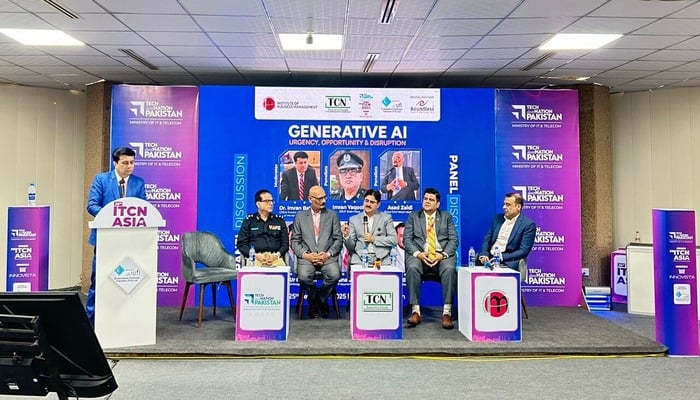
Generative Artificial Intelligence (AI) is no longer merely a "buzzword". Instead, it is reshaping various industries, accelerating innovation, and disrupting traditional systems more rapidly than ever before.
This was the impression that echoed at ITCN Asia 2025, Pakistan's largest tech exhibition held in Karachi from September 23-25.
Based on research conducted by McKinsey and Company, generative AI could add between $2.6 trillion and $4.4 trillion per year to the global economy, with the largest benefits to a combination of customer service operations and enhancements to marketing, sales, software engineering, and R&D.
The urgency of generative AI themes was also reinforced at ITCN Asia 2025 by experts who prioritised the opportunities and disruption that generative AI has the potential to bring.
Titled "Generative AI: Urgency, Opportunity and Disruption", the discussion included some truly inspiring technological perceptions, highlighting that many Pakistani organisations cannot afford to continue lagging in the adoption of AI and similar tech.
"As an organisation targeting only 5% or 10% growth, you're missing the opportunity; think 50%, 100% or even 200% growth," briefed Chief Digital Officer and Director of the Centre for Information Technology (CIT) Imran Batada.
Batada addressed the speed of generative AI adoption compared to previous technology adoption: "It took YouTube several months to reach 100 million users? Generative AI tools did it in two months. The change is real."
Additionally, Batada urged students and young people to build capacity now, noting those organisations that do not adapt “will not be able to sustain.”
Adoption rates are taking off at an unprecedented rate. As outlined in a report by Bain and Company, nearly 85% of global executives are experimenting with or deploying generative AI, making it one of the fastest technology adoptions in history, faster than cloud computing and even smartphones.
From the energy sector, Sui Southern Gas Company General Manager Jamil ur Rehman noted generative AI is “no longer a buzzword” but a need. “We have tonnes of data in Pakistan, but it is sitting in silos. If we can combine and utilise it with AI, it will be a game changer for decision-making,” he said.
During Pakistan's most prominent tech expo, upcoming government initiatives were also unveiled. DG IT Government Rana Shazad announced plans for “an incubation centre for youth where they can work on tech innovations, freelancing and business ideas.”
He also indicated that Google certifications that are free for students are being distributed to help them build AI-ready skills.
Leaders in the industry also talked about the risks associated with the foresight. According to Alkaram Group Chief Operating Officer Shah Abdullah Raza, "Generative AI is changing the way we work; organisations that do not upskill will be at a disadvantage to their competition."
He warned the users about data privacy and asked everyone to "understand what to share and what not to share and build skillsets accordingly."
Furthermore, according to Deloitte's State of Generative AI in the Enterprise report, more than 60% of organisations using generative AI globally are hopeful for measurable results, particularly in relation to productivity and innovation.
Experts at ITCN Asia acknowledged that AI is revolutionising Pakistan's tech landscape, highlighting its $4.4 trillion global economic potential, stressing the need to upskill youth via free certifications, and rapid adoption to avoid obsolescence.
As adoption is outpacing historical records, Pakistan’s young talent pool can position it as an AI-driven innovation hub.
















